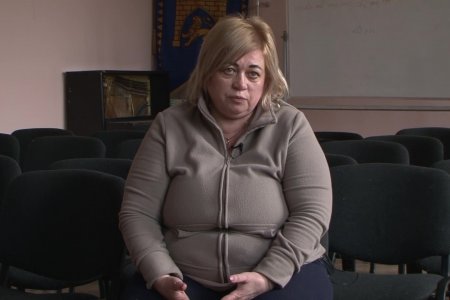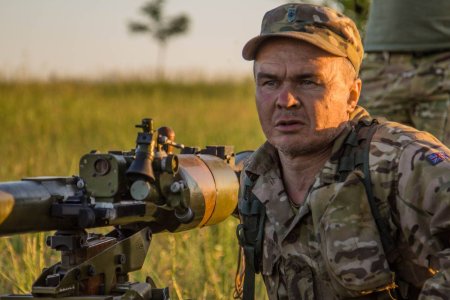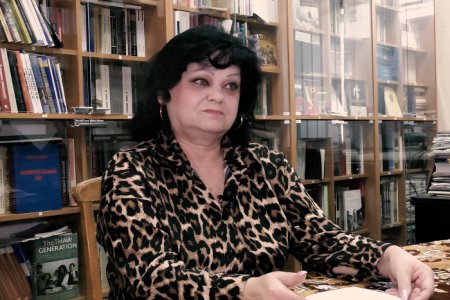I am Kononenko Mykola Ivanovich. I settled here more than ten years ago. I worked in a service center, repairing TVs. I saved my salary for ten years and built this house. I didn’t spend a dime of the family budget. Before that, I was a leading engineer in rocket technology, robotics. I frequently went on business trips to various secret factories. I built the house according to my own design. I made it so that the cooling was from the ground: I buried the pipes so that the air conditioner was natural. I walled up two pipes in each room. The inside of the house was completely wooden. I also planned to complete the attic to equip a workshop and open a service center. I wanted to repair equipment. I planned to move to a permanent place of residence last spring. I have a document — a technical passport. Just for health reasons, I could not live here in the winter. Therefore, I lived here in the summer, and we moved to Kyiv on New Year’s Eve.
Did you expect a full-scale war?
I didn’t believe it. As an engineer, I know that all the missiles I helped produce now fly at our heads and were manufactured at Kuchma’s factory. I spent a year on business trips. Our teams went to Russia to perform maintenance. After 2014, the brigades stopped going there, and there were no checks. There was a high probability that these missiles would simply fall on their heads, which was demonstrated when they tried to launch two missiles from the coalmines. They burned out because there was no technical inspection. All this was done in Ukraine. They [Russians] are trying to improve them, but all the same, the SS-20 — “Satan” was produced in Dnіpro.
I did not believe their technology could overpower a great country like Ukraine. It doesn’t fit in my head.
Did they plan to come to a city of three million people with machine guns? After all, everyone, even from a balcony or somewhere else, will throw something on their heads. I didn’t believe it! Our people are partisans. I had a surveillance camera and saw everything here until the very end, when they knocked down the poles, and the light disappeared. There was a checkpoint on the road opposite me. They set up a booth connected to my electrical network. I even saw at night how they ran around with flashlights and machine guns. I just bought a new camera, which has a 30x zoom. I will hang it there on a pole and observe all the fields. And then I’ll set the alarm, as it was before.
How was the first day of the war for you?
We slept, I was in the Darnytsa district, and we didn’t hear explosions. We only found out in the morning. Of course, we could not believe that rockets were flying at our airfields. The son went to Zakarpattia, where he had friends. They wanted to pick us up, but we refused. We have two cats, so we decided to stay. At first, we hid in the basement of our nine-story building, and then we stopped going there because it was unsuitable as a shelter.
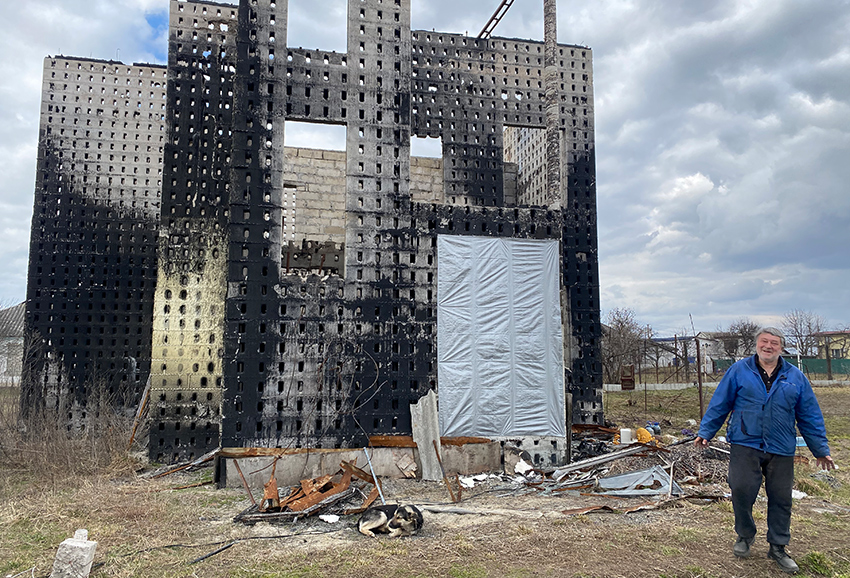
Did you and your wife stay in the capital?
She works for Kyivenerho as a chemist at CHP-5 [Thermal Power Plant]. She had to perform her duty, so a car came and picked her up.
Did missiles hit CHP-5?
There were three hits. People were not injured, but the equipment was — foreign measuring equipment. From strong blows, it simply stopped working. And the blocks themselves are somehow twisted there. CHP-5 gives heat to half of Kyiv. And why did nothing happen to CHP-6? Because they used maps probably from the 50s. There was no CHP-6 at that time. Here is an example from a neighbor whose house belonged to the railway. The railway and all other facilities are marked as various military units on old maps. They [the Russians] unfolded the map where they saw such a mark. However, a railway has long existed, and people live around it. They came to these people and said: “Show me your transmitter. Where is it?! A Buryat came to the neighbor: “What city is this?” He saw paved roads in the village for the first time and thought this was a city. The neighbor said the guy was short. She said she’d hit him on the head if it weren’t for the gun. He went around, poking at children with a machine gun.
What happened in the Velyka Dymerka?
They had headquarters here, in Bohdanivka, near the Coca-Cola factory. Here they rode. Tanks were buried at Parnykova Street, and here they drove around the street in armored personnel carriers. They shot, and all the windows and fences were cut into fragments. The dead were on our street. — “Many?” — “I only know a few people. They went out to look and got shot at ...” As my friend told me, he tried to go to the center of the village. He got there and saw how they broke the windows in the supermarket and carried boxes of provisions from there. They told him: you, grandfather, do not go to the gardens. Only along the streets, because we shoot those who walk in the gardens. Shopkeepers were killed, as far as I know. They [Russians] demanded money. Because there was no money, they killed them and took away the food.
Was there artillery shelling?
There was shelling while we were liberated, and it was horrific. The roof flew off near the hostel, and it was such a blast! Here, even cats died from such a pressure drop. The neighbor covered himself with a hatch, saying goodbye to life.
How many people were left in the village?
A lot. They sat in the cellars. I contacted them, interested in what happened to the house. We learned how to charge phones from car batteries. So I called one neighbor, then another. I always asked them to tell me what was happening there and how is everybody. But they were not allowed to go outside; an armored personnel carrier stood in the yard two houses down the road. The shock wave shattered almost all windows, and the wreckage damaged the fences.
Tell me about your home.
It was built with the latest technology from foam blocks that folded like a constructor. Rebar was installed, and concrete was poured there. I had Styrofoam five cm outside and five inside. Even without tools, it automatically leveled itself when you put it together. You can lay four rows, and where one side is not horizontal, it raises itself. You check with a laser, and there is only a few centimeters deviation.
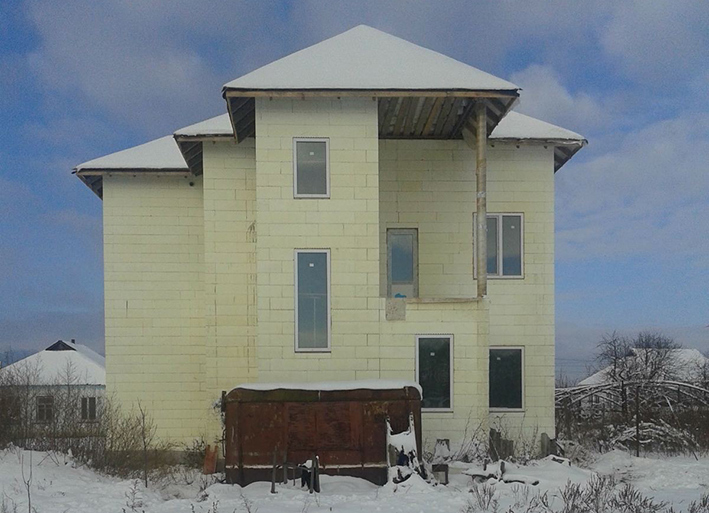
I wanted to make a super-house with a heat pump and was about to drill a second well. I took a compressor from work and was going to cool the water with the groundwater from a well in the basement. And where to dump the waste? The lake was not allowed. I was going to send it into the second well and even bought a small 100-watt pump to accomplish it. However, my pump burned down.
What is the area of your house?
According to the documents, it’s 150 square meters.
It burnt down. Something incendiary, perhaps phosphorus, flew in, and it flared up. It was all Styrofoam, plus I had Styrofoam cubes on the third floor. The floors are wooden, and there was still a lot of wood inside to build a summer kitchen and a garage. All these materials burned very intensely.
All the metal — aluminum just evaporated or rather turned to powder. There were about a dozen TV sets that I repaired. There is nothing left of them.
There were no ashes here because everything just evaporated from the high temperature. How can it be demolished now? I don’t know. Let it be a monument to the war. I have already said, let the village council pave the alley and lead the pioneers here. It’s all concrete. How many parts were under the concrete? Everything melted. Well, I could remove them, but what to do with concrete? I don’t need it for my garden. Building something here will not work. My foundation was at a depth of five meters. It went down like a ribbon, and then the house immediately grew from this ribbon. There is nowhere to put bricks because it needs to go one and a half meters deep, and still, there is no place there. That is, it is impossible to restore it. The steps are all burned out, and the structural elements. Everything is shaking. The gooseberries burned down, and the grapes. There was a plum tree there — it also burned down.
When was your house destroyed?
I tried to find out ... There was a shootout, and people were sitting in the cellar. The neighbor was even afraid to go down to the cellar and sat in the empty water well, covering himself with a hatch, saying goodbye to life. It happened sometime between the 12th and the 15th. From Gogolev, ours were advancing, and shells flew from there and from Bohdanivka.
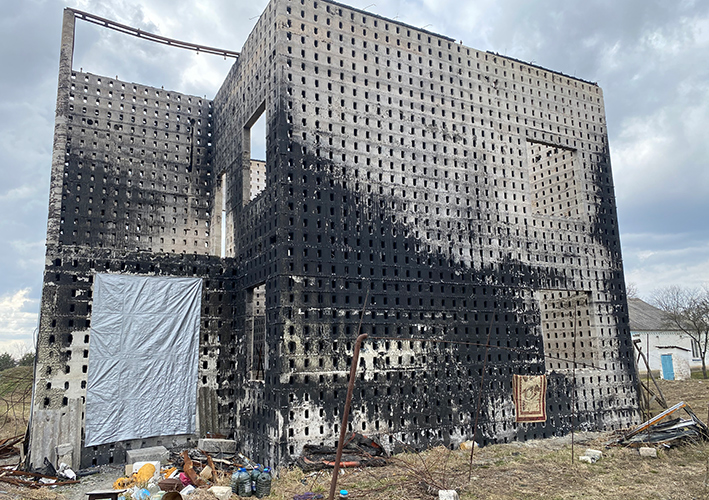
No one can say exactly when the house was destroyed. But in this life, I will no longer build. The entire life resources are over. If they allow me to buy an apartment somewhere, my son will have an inheritance. And my wife and I will make a summer kitchen: I still have blocks left, and we will come here for the summer. But all the old dreams are over. I wanted to bring my mother-in-law here. I thought it would be more fun. She was in Basan, and there was also a tank in her yard, so it was impossible to take her out. She offered to come, saying all of Kyiv was coming to her village. But how to get there when the bridges have already been destroyed, and the transport did not run? And a day later: “Take me back.” How could we pick her up? It was already too late and impossible to get there. After the liberation, she was found in her room, dead.
— “Dead?” — “Yes.” It’s unclear what happened; she was 82 years old, and maybe her heart stopped, or something happened to her ... But they said there were no bodily injuries. Hers was the last house in the village, and she had a tank in her yard. These monsters broke the fence and the garden while leaving. Driving five meters around was possible, but he just went straight ahead. We don’t even know when she passed away. It was impossible to call because there was only one mobile tower called Vodofonovskaya, which must have been smashed. Wherever we called, all the people left. Only the older people remained.
The Russians went from house to house, and a relative told me that even a cow could be fed only with their permission. Each time they asked if there was anyone in the cellar.
And she has a daughter, who was hiding there so that she would not be raped. — “Is there anyone in the cellar?” — “No.” — “And if I now throw a grenade?” They behaved insolently. There were not Buryats, but someone else. In our village, they said, were definitely Buryats, but there, it seems, the Chechens. They said the Chechens were not so evil.
What are you planning to do next?
Build a summer kitchen. Our garden is already starting to grow, but grapes are out. We are getting old and do not want to stay in Kyiv. What are we going to do? Look at the ceiling? And to live here, as I understand it, no one will. I think my son has no desire, and since there is no desire, they will sell everything here after me. No one will build a big house here. My son is already over 40. He never married. Who will live here besides us? Therefore, it is better to give our compensation to the son and let him acquire something.
Has your attitude towards Russians changed?
I knew what kind of people they were from the time of business trips. I remember one business trip. They made machine tools, and we made electronics. Our programmers constantly worked on debugging problems, but when one of us was gone, they immediately reported to the minister that Ukraine was missing all deadlines. I was there once, and they called the minister on the phone in front of me, saying the Ukrainians are not succeeding here, but everything is fine with us. And I pulled out the phone and shouted that they were lying! I said their machine was only half ready, but everything was fine with our product. You can come and see it. After that, the bonus was removed from me, and we became enemies. As a leading engineer, I communicated at a high level with the leaders, but they turned away from me after that. They are, by nature, morons.
I communicated with the son of Koshkin. Koshkin invented rotary conveyor lines when the shells from the cartridges (20 millimeters in the plane) fly out at the speed with which the plane shoots. And so we argued with his son about what to use to make equipment: microcircuits or transistors. I proved to him that the reliability of one microcircuit is the same as one transistor because it is made with one chip and one processor. And he told me that there are a million transistors in the microcircuit, so the reliability of the microcircuit is a million times lower than that of a transistor. He did not want to use transistor circuits, and I couldn’t prove anything to him. But what was there to prove? Their job was to make a machine. Ours was electronics. In the end, we did not complete this machine.
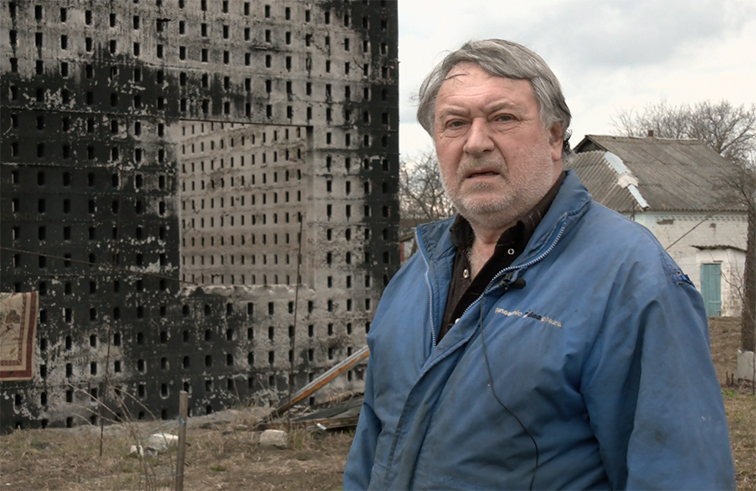
They seem to have something left in their blood from the Tartar Mongols. They do not like to live beautifully. They were surprised that we had everything here. Why do we all need it if we can live easier? However, we are all trying to do a bit better — better than the other one. Everyone has some passion, but it’s not there [in Russia]. It’s full of booze. Once, we were in Bulgaria with them for two weeks, and then there was an anti-alcohol campaign. They bought up the entire supermarket. They have not seen this in Russia — there were no supermarkets back then. And in Bulgaria — it was. You had to run around with a torch to buy vodka at night in Russia. But in Bulgaria, you come in — and there are whiskey boxes under your feet. They were dumbfounded and started drinking! They are daft but with delusions of grandeur. Then we were proving that Ukrainians invented everything anyway, either Jews or Ukrainians. Rockets and everything else came from us: Korolev and Sikorsky’s helicopters are ours.
